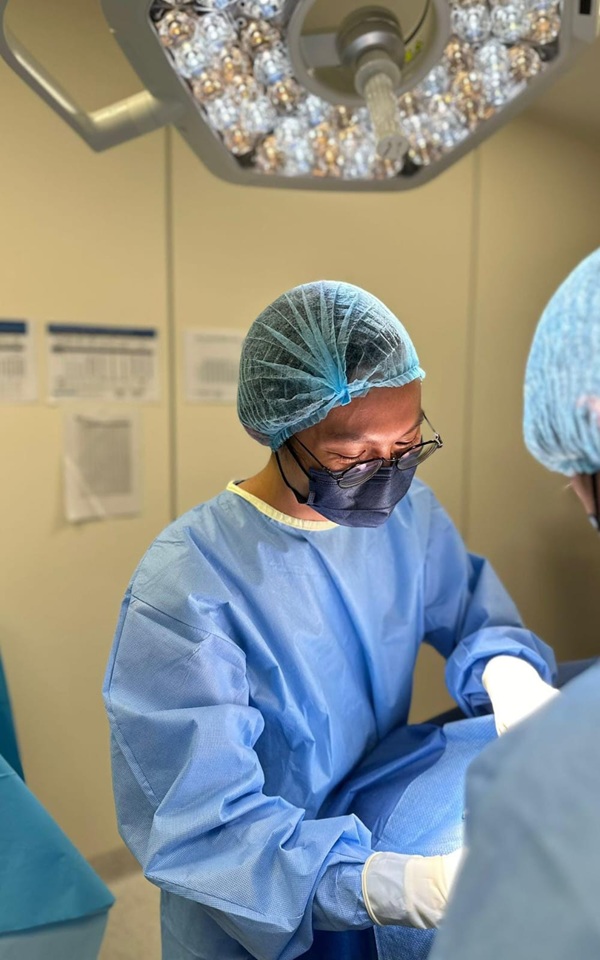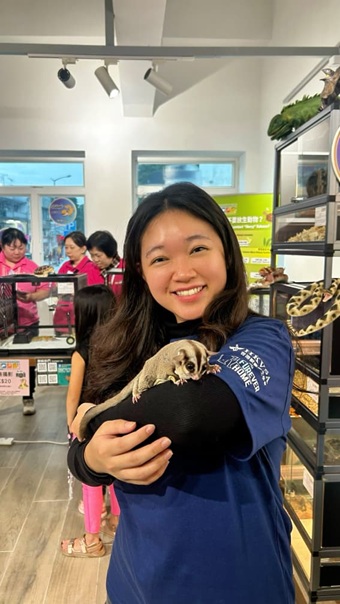
By Betsy May Veloo
With more and more households in Malaysia adopting pets, the demand for veterinarians is increasing exponentially. According to people in the animal welfare industry, there appears to be a shortage of animal doctors in this country.
While a growing number of universities in Malaysia are now offering degrees in veterinary medicine to make up for the shortfall, students who could not make the cut for varying reasons have opted to go abroad to make their dreams of becoming a vet come true.
This writer caught up with two Malaysian students who decided to throw caution to the winds and take their chances in Hong Kong.
Growing up in Sungai Petani, Kedah, Lynnox Loo’s ambition was to become a medical doctor. Then he thought: “No, maybe I will become a dentist.”
Then, when he acquired two dogs as pets, a German Shepherd and a Dachshund, he changed his mind again.
Having pets made him realise how little he or his family knew about animals and their diseases. “I got increasingly frustrated at our lack of knowledge about taking care of animals as pets.”
When his dogs died due to the use of older-generation drugs used to treat tick infestation, he was devastated. That experience triggered a deep desire within him to become a vet.
His parents were not too happy with his decision at first…they wanted him to pursue a dentistry career. But Loo remained adamant. He will become a doctor for animals, whatever the odds.
He left Sungai Petani after high school to pursue his A-levels in KDU College in Georgetown, Penang (now known as the UOW Malaysia KDU Penang University College). “After completing my Cambridge IGCSE and A-Levels in 2018, pursuing veterinary medicine was the natural next step for me.”
Since he took the International General Certificate of Secondary Education (IGCSE), this meant he did not sit for the Bahasa Malaysia and Sejarah papers. Not having these two credits made him ineligible for entry to the two local universities – Universiti Putra Malaysia (UPM) and Universiti Malaysia Kelantan (UMK), which were offering a five-year Doctor of Veterinary Medicine programmes.
“I hadn’t taken the Mata Pelajaran Umum (MPU) modules in college, and without these, it was difficult for me to get into the local government universities,” Loo explains.

But that did not deter him. While Australia and the UK were the two favourite overseas vet destinations, the fees in the colleges were exorbitant. Closer to home, Indonesia, Taiwan, India, Pakistan, and, comparatively recently, Hong Kong were also offering veterinary medicine.
Why Hong Kong?
So, Loo began his arduous research into the merits of different overseas universities offering veterinary medicine.
The City University of Hong Kong (CityU) was the latest in the region at the time to open a veterinary school (now known as The Jockey Club College of Veterinary Medicine and Life Sciences) and was accepting various international qualifications, including A-Levels, International Baccalaureate (IB), and the Unified Examination Certificate (UEC). Its six-year Bachelor of Veterinary Medicine was established in collaboration with Cornell University’s College of Veterinary Medicine, currently ranked 2nd in the world for veterinary education (according to the QS World University Rankings by Subject, 2025).
“The school’s Bachelor of Veterinary Medicine (BVM) programme somehow stood out for me. The programme’s transparency, well-structured and holistic syllabus deeply impressed me. It goes beyond traditional companion animal care, incorporating four key themes: animal welfare, aquatic animal health, emerging infectious diseases, and food safety, all of which are extremely important in Asia,” says Loo.
He was also drawn to the vet school’s local and overseas practical placements throughout the degree and its commitment to accreditation. “Because of these compelling reasons, CityU’s BVM became the clear choice for my veterinary journey.” Loo graduated earlier this year and has just joined a vet hospital in Hong Kong.
While Loo embarks on his chosen career, another Malaysian, Lai Min Hua, has another five years to go before she graduates from the same vet school in Hong Kong.
Like Loo, Lai did not have the necessary qualifications to enter a university in Malaysia to take up veterinary medicine. Her family had moved to Brunei when she was very young.
While in high school there, she took the GCE ‘O’ and ‘A’ level exams, which naturally did not include the Malaysian SPM curriculum. This was the major obstacle for Lai — she would have had to apply as a foreign student, despite holding a Malaysian passport.
“I graduated from Universiti Brunei Darussalam with a degree in Biology, and, as a degree holder, to take the SPM exams so that I could meet the university eligibility criteria seemed a little absurd to me!”
With no viable options left, she looked to studying abroad.
Like Loo, she discovered that Hong Kong’s City University had established a veterinary school and was the city’s first and only one. “I thought that it would be an amazing opportunity to be part of a pioneering institution.”
The icing on the cake for her was when she learned that the school’s Bachelor of Veterinary Medicine programme was jointly developed with Cornell University in the US. She immediately applied to CityU and was accepted in 2023.
Memorable Moments
Lai’s interest in veterinary medicine started while she was in high school. She had stumbled across a video in which a veterinarian was shown treating a stray cat with an abdominal hernia.
“I eventually learned that this particular vet, while running his own clinic, had also started a charity for stray animals in his area. It was truly awe-inspiring to see his dedication to helping the voiceless.”
Lai then began exploring fostering animals, and one day, she adopted a dog. Having a pet strengthened her aspiration to become a vet, she says.
Both Loo and Lai discovered that being a vet does not always involve the cute and cuddly. It also meant hours of getting one’s hands dirty and grubby right from the get-go. But their experiences were unforgettable, they say.
Loo recalled the first time he had to handle a snake. “It was quite terrifying, but because there was a snake expert in the facility with us, I felt safe.” But it was another reptile that left its mark on Loo. “I was bitten by a turtle…and it was so painful!”
For Lai, seeing horses and cows up close and personal was “absolutely surreal.”

“Having never even been in such close quarters with them before, I was really scared when handling them for the first time,” she recalls. “But eventually, with experience, you learn to read their body language and behaviour, so you’ll know if it is okay for you to proceed or not.”
For both of them, memorable moments did not only centre on the animals they handled but on the human friendships they forged.
Home Away from Home
During the summer holidays, students from different countries and backgrounds would be split into small groups for their husbandry placements in farms or animal shelters.
We would go to our placements together, sometimes waking up before sunrise to get to our destinations on time and only reaching home after the sun had set. It is truly such a unique experience to work in these new environments with other students and to handle different animal species,” says Lai.
The camaraderie formed turned into unbreakable bonds. Lai recalled how when once, she badly sprained her ankle and ended up in the emergency ward for six hours, her varsity friends stayed with her, even though it was nearing exam time. “Having friends you can rely on is really important. Away from home, they are essentially your second family.”
“We are a very small, tight-knit Malaysian community here in CityU”, she adds, “and we always get together to makan at least once a week without fail, and occasionally we also connect with other Malaysian students in Hong Kong.”
Loo agrees, saying what made it truly special was how students evolved beyond classmates into a family. “The programme was intensely demanding – physically with its rigorous labour, and mentally, with its relentless pace. Without my study group and rotation team, those six years would have been unbearable.
“We pushed each other to excel, gently corrected mistakes, and provided unwavering support during tough times – both in our studies and personal lives. Some of our most meaningful moments came during sleepless study nights and passionate discussions over meals, whether preparing for exams or analysing complex clinical cases.”
These shared struggles didn’t just make him a better person, Loo noted. “They created bonds that last beyond the vet school, and act as a reminder that this vet journey is never meant to be walked alone.”
Since the school’s opening, nine Malaysian students have enrolled, of whom six have graduated. In the meantime, Lai is not sure where her veterinary career will take her. After all, she still has some years to go before she becomes a full-fledged vet. However, Loo hopes to return to Malaysia one day to practise.
He has already begun “navigating” the registration process with the Malaysian Veterinary Council. He says even with CityU’s dual-accredited degree, it is taking a bit of time due to the complexities of transnational veterinary licensing.
But he remains hopeful for a resolution as Malaysia continues to develop its veterinary regulatory framework.
Until that happens, both Loo and Lai will be honing their skills to make themselves truly prepared to take on the challenges the field of veterinary sciences throws at them, whether in Malaysia or elsewhere.
Calling All Educational Institutions
Does your establishment have a unique field of study, breakthrough programme, or inspiring curriculum to share? Let Weekly Echo help you shine. As a for-profit news organisation committed to sustainable journalism, we spotlight stories that shape future minds.
Feature your institution’s strengths, innovations, and academic vision on our platform.
Reach out to us at 012-2037137 or email weeklyecho2021@gmail.com to start the conversation.
WE